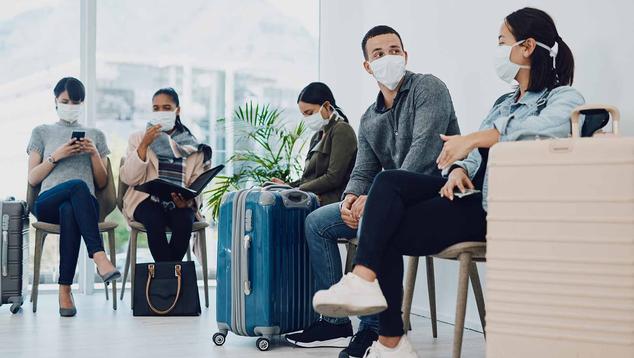Story Highlights
- Travelers need more than discounts to get them back in the air
- 77% are very or moderately concerned about COVID-19 exposure at the airport
- Health procedures and communication should be a top priority for airlines
Light is breaking through the clouds for the airline industry as COVID-19 lockdowns and travel restrictions ease.
After months of flight and route restrictions -- and more than $10 billion in losses -- the industry is more than ready to welcome passengers back into the air.
Passengers aren't quite so ready, though.
A June-July Gallup study shows that 77% of Americans are "very" or "moderately concerned" about coronavirus exposure while traveling through the airport, and 82% of Americans are very or moderately concerned about coronavirus exposure while traveling by airplane.
Only about one-fifth "strongly agree" that following the airport's (21%) or airline's (22%) health policies will keep them safe.
Some airlines are responding by cutting prices, which is a time-tested method of attracting customers. And 70% of respondents in the Gallup study said that price reductions and incentives would make them more likely to "travel by plane within the next six months."
But dropping prices -- or launching a price war during a financial catastrophe -- may not be airlines' best strategy. According to the Gallup study, customers do care about price, but they care about their health a lot more.
The customer experience should include meeting customers' emotional needs.
In some ways, this is good news for the industry. Meeting customers' concerns -- such as screening for illness, offering hand sanitizer and requiring masks -- is fairly inexpensive and some of those efforts have been underway for months.
Yet customers are still hesitant to return to the air; our study found that 60% are very concerned about flying. That indicates a big gap between airlines' efforts and customers' emotional needs.
Customers do care about price, but they care about their health a lot more.
Meeting those needs, Gallup analytics find, requires:
Communication about health concerns: Airlines shouldn't wait for customers to get to the airport to explain health and safety protocols -- that information should be upfront wherever potential customers look: websites, travel agencies and ads.
There's no such thing as too much communication, either. Passengers should know about everything from HEPA filters to employee safety rules.
And because 78% of customers want direct communication about health policies, their confirmation email or text should be personalized and tailored to their concerns. People traveling with toddlers should learn about the airline's policies regarding masks for children, for example, or current COVID-19 restrictions in the destination city.
Loyalty programs provide an excellent platform for communication: They aren't stoking interest in flying right now, but they're a direct line to customers.
Visibility of health policies and cleaning procedures: The basics of environmental quality are what customers care about most but might be the least noticeable -- commercial enterprises tend to keep housekeeping discreet.
Now's the time to make health measures extremely obvious. Employee health screenings and cleaning should be done as publicly as possible.
Social distancing and mask-wearing should be enforced consistently. Hand sanitizers and sanitizing wipes should be readily available. In fact, the availability of hand sanitizers and wipes is the second-most important issue to customers, just one percentage point below staff health screening before flights.
Touchless technology: Using touchless tech as much as possible is a top priority to 80% of passengers. And tech that processes passengers quickly is an investment that will pay dividends in efficiency when the pandemic is over.
But the ROI on new seating concepts -- like the "Janus" model of rear-facing middle seats and plexiglass dividers between seats -- is not assured. Design and manufacturing can take years to execute, so installation may come when passengers no longer care.
Even if an airline can quickly and successfully implement change, Gallup's study makes it clear that customers don't want to touch anything others have touched. Airlines should probably take that literally.
Life over money: Customer behavior is predictable right now.
Gallup's study shows that security is more essential to customers than a discount -- the answer to the question, "Your money or your life?" is predictable -- but it also indicates just how much an airline's brand image matters.
It's so important that personal experience with an airline is far less meaningful to customers than the brand's overall reputation. There's a 24-point difference between those who say their security with an airline comes from prior experience with a brand (56%) and those who are confident just because the "the airline has a good reputation" (80%).
It goes to show that investing in customer engagement and making good on the brand promise -- and being aware of what customers really value -- pays dividends.
And yes, some airlines will have to revise their reputation among customers, but none should rest on their laurels: The situation is an extraordinary opportunity to meet customers on an intensely emotional level. Any sentiments customers form will outlast the pandemic.
But for now, airlines that make customers feel safe have an upper hand in a price war. They may be able to avoid one entirely.
Customers do care about price, but they care about their health a lot more.
- Download our report How to Build a Customer-Centric Culture.
- Explore our consulting services on customer centricity.
- Read about how Southwest Airlines' employees use their strengths to make customers feel like family.





